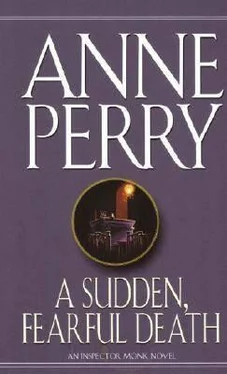"All right," he conceded. "It was a foolish thing to have said. I beg your pardon. But you are looking at it from her point of view. I am trying to see it, however mistaken they are, from that of the authorities who would-or would not-have allowed her in. And honestly, however unjust, I believe there is no chance whatsoever that they would."
"They might have," she said passionately, "if Sir Herbert had argued for her."
"We'll never know." He pursed his lips. "But it does shed a different light on it. It explains how he had no idea why she appeared to be in love with him." He frowned. "It also means he was less than honest with me. He must have known what she referred to."
"Less than honest!" she exploded, waving her hands in the air.
"Well, he should have told me he gave her some hope, however false, of being admitted to study medicine," he replied reasonably. "But perhaps he thought the jury would be less likely to believe that." He looked confused. "Which would make less of a motive for him. It is curious. I don't understand it."
"Dear God! I do!" She almost choked over the words. She wanted to shake him till his teeth rattled. "I read the rest of the letters myself-carefully. I know what they mean. I know what hold she had over him! He was performing abortions, and she had detailed notes of them- names of the patients and days, treatments-everything! He killed her, Oliver. He's guilty!"
He held out his hand, his face pale.
She pulled the letters out of her bag and gave them to him.
"It's not proof," she conceded. "If it had been, I'd have given them to Lovat-Smith. But once you know what it means, you understand it-and what must have happened. Faith Barker knows it's true. The chance to study and qualify properly is the only thing Prudence would have cared about enough to use her knowledge like that."
Without answering he read silently all the letters she had given him. It was nearly ten minutes before he looked up.
"You're right," he agreed. "It isn't proof."
"But he did it! He murdered her."
"Yes-I agree."
"What are you going to do?" she demanded furiously.
"I don't know."
"But you know he's guilty!"
"Yes… yes I do. But I am his advocate."
"But-" She stopped. There was finality in his face, and she accepted it, even though she did not understand. She nodded. "Yes-all right."
He smiled at her bleakly. "Thank you. Now I wish to think."
He called her a hansom, handed her up into it, and she rode home in wordless turmoil.
* * * * *
As Rathbone came into the cell Sir Herbert rose from the chair where he had been sitting. He looked calm, as if he had slept well and expected the day to bring him vindication at last. He looked at Rathbone apparently without seeing the total change in his manner.
"I have reread Prudence's letters," Rathbone said without waiting for him to speak. His voice sounded brittle and sharp.
Sir Herbert heard the tone in it and his eyes narrowed.
"Indeed? Does that have significance?"
"They have also been read by someone who knew Prudence Barrymore and herself had nursing experience."
Sir Herbert's expression did not alter, nor did he say anything.
"She writes in very precise detail of a series of operations you performed on women, mostly young women. It is apparent from what she wrote that those operations were abortions."
Sir Herbert's eyebrows rose.
"Precisely," he agreed. "But Prudence never attended any of them except before and afterwards. I performed the actual surgery with the assistance of nurses who had not sufficient knowledge to have any idea of what I was doing. I told them it was for tumors-and they knew no differently. Prudence's writings of her opinions are proof of nothing at all."
"But she knew it," Rathbone said harshly. "And that was the pressure she exerted over you: not for marriage-she would probably not have married you if you had begged her-but for your professional weight behind her application to attend a medical school."
"That was absurd." Sir Herbert dismissed the very idea with a wave of his hand. "No woman has ever studied medicine. She was a good nurse, but she could never have been more. Women are not suitable." He smiled at the idea, derision plain in his face. "It requires a man's intellectual fortitude and physical stamina-not to mention emotional balance."
"And moral integrity-you missed that," Rathbone said with scalding sarcasm. "Was that when you killed her- when she threatened to expose you for performing illegal operations if you did not at least put in a recommendation for her?"
"Yes," Sir Herbert said with total candor, meeting Rathbone's eyes. "She would have done it. She would have ruined me. I was not going to permit that."
Rathbone stared at him. The man was actually smiling.
"There is nothing you can do about it," Sir Herbert said irery calmly. "You cannot say anything, and you cannot withdraw from the case. It would prejudice my defense totally. You would be disbarred, and they would probably declare a mistrial anyway. You still would not succeed."
He was right, and Rathbone knew it-and looking at Sir Herbert's smooth, comfortable face, he knew he knew it also.
"You are a brilliant barrister." Sir Herbert smiled quite openly. He put his hands in his pockets. "You have defended me almost certainly successfully. You do not need to do anything more now except give a closing speech- which you will do perfectly, because you cannot do anything else. I know the law, Mr. Rathbone."
"Possibly," Rathbone said between his teeth. "But you do not know me, Sir Herbert." He looked at him with a hatred so intense his stomach ached, his breath was tight in his chest, and his jaw throbbed with a pain where he had clenched it. "But the trial is not over yet." And without waiting for Sir Herbert to do or say anything else, to give any instructions, he turned on his heel and marched out.
They stood in Rathbone's office in the early morning sun, Rathbone white-faced, Hester filled with confusion and despair, Monk incredulous with fury.
"Damn it, don't stand there!" Monk exploded. "What are you going to do? He's guilty!"
"I know he's guilty," Rathbone said between his teeth. "But he's also right-there is nothing I can do. The letters are not proof, and anyway, we've already read them into evidence once, we can't go back now and try to tell the court they mean something else. It's only Hester's interpretation. It's the right one-but I can't repeat anything Sir Herbert said to me in confidence-even if I didn't care about being disbarred, which I do! They'd declare a mistrial anyway."
"But there must be something," Hester protested, desperately clenching her fists, her body rigid. "Even the law can't just let that happen."
"If you can think of anything," Rathbone said with a bitter smile, "so help me God, I'll do it. Apart from the monumental injustice of it, I can't think when I have hated a man so much." He closed his eyes, the muscles in his cheeks and jaws tight. "He stood there with that bloody smile on his face-he knows I have to defend him, and he was laughing at me!"
Hester stared at him helplessly.
"I beg your pardon." He apologized automatically for his language. She dismissed it with an impatient gesture. It was totally unimportant.
Monk was lost in concentration, not seeing the room around them but something far in his inner mind.
On the mahogany mantel the clock ticked the seconds by. The sun shone in a bright pool on the polished floor between the window and the edge of the carpet. Beyond in the street someone hailed a cab. There were no clerks or juniors in the office yet.
Monk shifted position.
"What?" Hester and Rathbone demanded in unison.
Читать дальше












